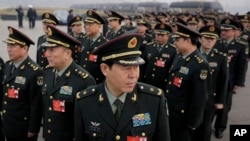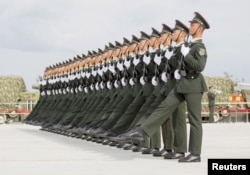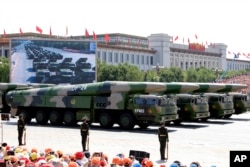China’s slowing economy is having an impact on government spending, including the country’s closely watched military budget.
Fu Ying, a spokeswoman for China’s largely rubber-stamp parliament, told reporters Friday the military will see an increase of seven to eight percent this year.
The announced increase is the first time China’s spending on defense has slipped below double-digit growth in six years, and follows more than a decade of nearly consistent double-digit growth.
The official figure will be announced Saturday when China’s National People’s Congress, the country’s top legislative body, begins its annual meetings in Beijing, Fu Ying said.
“China’s military budget is based on two key things: the needs of military development as well as economic development and government revenues,” she said.
Last year, China announced it was cutting its massive military by 300,000 troops, even as its territorial claims in the region have increasingly been a point of controversy.
'New normal'
Analysts said the reduction is very much in line with what China describes as its “new normal” for slower economic growth.
“With overall GDP growth in China moving below seven percent, it would be appropriate, I think, in the eyes of the leadership to calibrate defense expenditure more in line with that new normal,” said Alexander Neill, a Shangri-La Dialogue senior fellow for Asia at the Institute for International Institute for Strategic Studies in Singapore.
For more than a decade “the PLA (People’s Liberation Army) has been the recipient of a lot of cash from the central leadership and this may very well represent a gradual tapering down of that,” he added.
Transparency concerns
China is the world’s second biggest military spender, and while its annual budget last year increased by 10.1 percent, for a total of more than $135 billion, it still pales in comparison to the United States.
But the accuracy of the figures China releases is unclear as transparency has long been a concern, notes Jagannath Panda, an analyst at the Institute of Defense Studies and Analysis in New Delhi.
“We don’t know how transparent and how true it is,” Panda said, adding that the reduction could be made for some technical reasons. “There are so many gray areas in the Chinese military defense industry. We don't know where the funding comes from? How fundings are submitted? where are the expenditures really happening, or have happened?”
Such concerns, however, are overblown, said Wang Dong, a political scientist at Peking University. Wang said China’s military expenses actually account for about two percent of its annual economic growth, which is largely in line with what other countries spend.
He said China’s leaders note that much of the growth in the defense budget is actually related to the increasing role China plays internationally.
“We can point to many examples including China’s huge increase in its commitment into the United Nations peacekeeping operations and its contributions to counter-piracy operations,” he said.
Budget messaging
Still, the decrease in funding comes at a time when China’s rapid construction of artificial islands and rigid claim to almost all of the South China Sea is raising concern among its neighbors. Part of the reason for the decrease in spending could also be aimed at calming nerves in the region.
“The political message is perhaps a rebuttal of that. It is saying that China is prepared to reduce and curb defense expenditure,” said Alexander Neill. He said the reduction could also be a “political message that China is willing to show restraint.”
By slowing its budget growth, China appears to be trying to send a subtle message that it is not a security threat and that its neighbors should see it as a country that is seeking cooperation, said Jagannath Panda.
Still, “there is no way that China is going to relax their positions” on territorial and security issues.
He adds that there also may be a domestic message to the reduction as well, given the widespread problem of corruption in the military. In the past, high levels of spending led to massive corruption problems and President Xi Jinping may be looking to address the problem and exert more control over the military complex.
“All of this could also be linked to China’s domestic reforms, particularly reforms in the military circle,” Panda said.
Saibal Dasgupta contributed to this report.

















